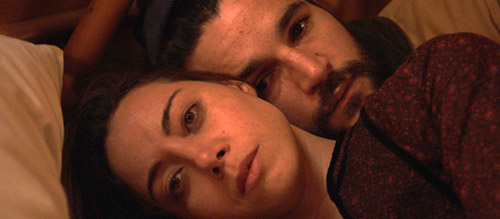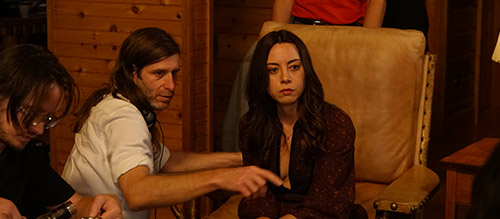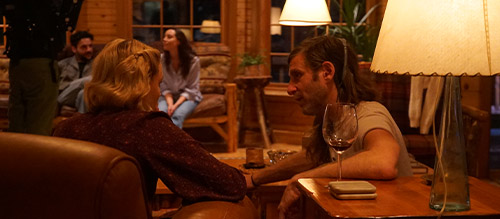Lawrence Michael Levine Interview – “I Will Always Make Small, Intimate Films”
This article was written exclusively for The Film Magazine by Jacob Heayes.
“It’s a pretty dark reflection of some of the more shadowy aspects of my interior life.”
A festival highlight from the past year, Black Bear has garnered critical acclaim for its unnerving pressure-cooker relationship drama and Aubrey Plaza’s sensational lead performance.
As the film finally heads towards its digital UK release, we had the opportunity to chat with the writer/director Lawrence Michael Levine about his personal inspirations, chaos in filmmaking and creating characters you can empathise with.
Warning: Spoilers Ahead!
Hi Lawrence! Thanks for taking the time today to speak with The Film Magazine and congratulations on the release of Black Bear. I really loved it. Could you tell me a little bit about what enticed you towards this concept?
I had been making films for about 20 years and writing professionally as a screenwriter for about 5. I was kinda taking stock and reflecting on my life as an artist and the sacrifices I had made, the tensions and difficulties I’d endured, and frankly I was in a place where I was wondering if I’d made the right decision with my life. I was looking back at the past and all the difficulty being an artist had caused me and wondering if it was worth it.
Did you have any specific inspirations during the writing or directing process, whether it be inside film or elsewhere?
Yeah, I mean there are so many really. Probably my biggest influence is my wife who’s also a filmmaker – her name’s Sophia Takal – and we’ve done a lot of projects together. We’re partners on most of my films and her films. A lot of it was thinking about balancing a romantic relationship with a professional and artistic one, and some of the difficulties that I was processing and working through. Obviously the movie is a heightened version of these things that existed in my life at a lower boil. Also, I had been writing these more conventional scripts in the Hollywood context with development executives and producers and things like that, very workshopped conventional projects. I wanted to go back to the kind of movies that inspired me to become a movie maker in the first place, which were not really the kind of things I had been working on to make a living for that 5-year period between my films. So it was going back to the original filmmakers who inspired me – John Cassavetes was a huge influence which, if you know his work, I think is pretty obvious to see. His influence was huge. Also Bergman – Scenes from a Marriage is a movie that I love. I wasn’t thinking about these so specifically so much as they were my original inspirations to become a filmmaker in the first place. Their influences have become so ingrained over the years that it just kind of spills out when I work. So I wasn’t “I’m trying to make a Cassavetes movie” or “I’m trying to make a Bergman movie”, it was much more that those influences are ingrained.
So you’d say this movie is a reflection of you, quite an intimate movie for you?
Yes, it is. I’d say it’s a pretty dark reflection of some of the more shadowy aspects of my interior life and my relationships, but that’s what I wanted to explore and look at. That’s kind of the purpose of the movie – that by making something positive out of your negative emotions and experiences, that you can share with other people, there’s something cathartic about it and it allows you to move forward. At least it allowed me to move forward. Although it wasn’t my intention, there was something therapeutic and cathartic about the experience of writing the movie, and it kinda helped me move forward in my life. I think that’s what I hope happens to Alison at the end of Black Bear. It was interesting that the experience of the character in the movie kinda mirrors my own in that regard.
I’m glad that you brought up Sophia actually, because I recently had the chance to sit down and watch Always Shine, which you also scripted and Sophia directed. I was struck by how many similarities there were thematically between these two films, particularly how prevalent the theme of loneliness is. What attracts you towards writing isolated and enigmatic characters?
I guess that must be how I feel inside, I don’t know (laughs). I was actually drawing a lot from my own experiences when I wrote Always Shine in particular. The movie was based on a short outline that Sophia had made and she showed to me. We started to talk about it and I ended up writing the movie. I know she feels that the movie is about her experiences – and it is – but it was also very much about my experiences. I relate to the character of Anna in Always Shine, I really do. I relate to the experience of not feeling right, wanting to be perfect, wanting to be accepted, wanting to be validated by a society whose ideas you sorta reject. It’s an uncomfortable feeling so I really relate to that character. In Black Bear, I relate to all of them. I felt a little bit like I finally understood what Flaubert meant when he said “Madame Bovary, she’s me”. I kinda felt that all these characters had something to do with my interior life. Identification in Always Shine was pretty strictly tied to Anna, but in Black Bear it was more diffuse.
I think that’s interesting that you say you identify with multiple characters, especially in Black Bear where you have the actors themselves inhabiting multiple roles. What’s your approach to writing these dual characters and do you find it challenging to direct actors working in these roles on set?
When I’m writing different characters, everything’s coming from me, so it’s kinda about exploring different aspects of myself and giving parts of myself different voices. You set up that this is who their character is and this is their voice. With Black Bear, I gave them pretty free rein to let them kinda do what they wanted based on the sketches I had drawn of them, so there was a lot of freedom in the writing of this particular movie that I might not necessarily give myself if I’m doing a job for hire. There was a lot of exploration, a lot of dialogue that didn’t end up in the movie, just to start to hear the characters’ voices. Once I’ve made the decisions about who they are, it’s almost a subliminal process that happens. They just start talking and I record it, so it’s almost like I’m a medium or something, where I’m just recording these voices that are speaking to me.
“I try to write dialogue like life – some people think it’s improvisation but it’s not, it’s scripted.”
Then, when I have to direct the film, usually there’s been a gap between when I’m writing and the start of the shoot, and I haven’t read the screenplay for a long time, so what I do is I read it again like a director who hadn’t written it. I break down the intention between every line, every movement that each of the characters make and I make a note of it. I don’t look at it again usually, I can’t remember any time I have. It’s there for me to look at that if I want but the shoots that I’ve done are so fast that it’s actually hard to rifle through your script and look through your notes, because you’ve got to watch the monitor too. I think I just have a memory of what every line is about and what every movement is about. I don’t share it with the actors unless they ask or appear uncertain, confused or troubled, so I just have that in my back pocket in case they need help.
I also want to talk about the Adirondack Mountains in this movie. I loved the setting. It’s incredibly striking and idyllic but also holds a lot of darkness. I’m curious what drew you specifically towards this setting?
It was kind of a pragmatic thing actually. A friend of mine showed me some pictures of his family’s camp around a lake in the Adirondacks and said I should shoot a movie here. At this point, I wanted to make a movie for myself and if I wanted to be sure it would get made, I needed to keep it small and cheap so I thought to write a screenplay with this specific camp in mind. By the time we were able to shoot the movie, the camp was no longer available. I had to visit various locations to see which would be easiest to transform into what I needed for the film. The setting in the movie was the only one that had everything we needed, which was three structures that all had a view of the lake. This was also the most beautiful and among the cheapest because it was the most remote. It’s 8 hours from New York City and it’s not even near any big towns, it’s really in the middle of the woods. It wasn’t convenient but it was beautiful and had everything we needed.
Do you think this film was defined by spontaneous decision making and experimentation?
In general, I try to be open to ideas that other people bring on set. The actors in particular were really creative and I gave them room to add things that weren’t in the script. The example that immediately jumps to mind is that Aubrey approached me on the day we were shooting her big breakdown scene and said it’d be cool if after her character does the scene, we have to hold for room tone. I thought that’d be so awkward and funny but also just intense and would give people a breather whilst letting us pan through the whole crew. I loved the idea so I put it in the movie. Most of the film was scripted. I try to write dialogue like life – some people think it’s improvisation but it’s not, it’s scripted. Then there are other things that people add. Chris took on a lot of my mannerisms when he played the director in Part 2, which he added and I didn’t realise until I watched the dailies after the first day. The actors did bring things to the story I was open to, and I did discuss the script with them beforehand and we made changes based on the discussions. I was pretty collaborative with the actors but it’s also not like we went in there with a 3-page outline. It’s a scripted movie.
Did you find it entertaining or daunting to make a film about filmmaking?
I enjoyed shooting Part 2 because I tend to be impatient on set. Directing a movie is a very, very challenging experience in terms of patience. The clock is always ticking and I just always feel like people are taking too long, and if we don’t start shooting by x hour, we’re not going to have a movie. I’m just in this perpetual freak out mode that I’m trying to contain. When you shoot handheld, things move a lot faster. You’re lighting more generally, you don’t have to worry about setting up the dolly, you don’t have to worry about the Steadicam or how we’re going to orchestrate this move. It’s much more documentary style. The actors have more freedom too, so they get looser and that’s really fun to watch. I enjoyed shooting Part 2. I didn’t enjoy Part 1 mainly for the reason I just mentioned. It was easier to shoot a movie within a movie because we didn’t have to hide any of our equipment. In this case, we didn’t have to worry about that one iota. We moved things into the shot on purpose.
I just hope the atmosphere on set wasn’t as intense as the one in the movie!
I wouldn’t know, man, I was in my own headspace (laughs). I can tell you my internal life was chaotic! I try to protect everybody around from what was going on inside me. I don’t know if I always succeeded (laughs).
Do you see yourself working on small films for the foreseeable future?
I don’t know. At one time, I thought this is maybe all I want to do. Right now though, I’m writing something that’s much bigger. I’m always interested in doing the thing I haven’t done yet. Black Bear was the biggest project I’ve done and it was still micro. I would like to work on bigger things. I’d like to have more time, I’d like to have more tools and see what that’s like. Maybe I won’t like it but I’m interested in it. I think I will always make small, personal films. I just don’t know if that’s all that I’ll do.
Black Bear releases on digital platforms in the UK on 23rd April.
This interview has been edited for clarity.
Written by Jacob Heayes
You support Jacob Heayes in the following places:
Twitter – @heyimjay_cob






